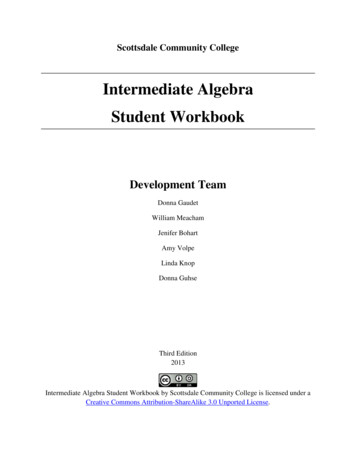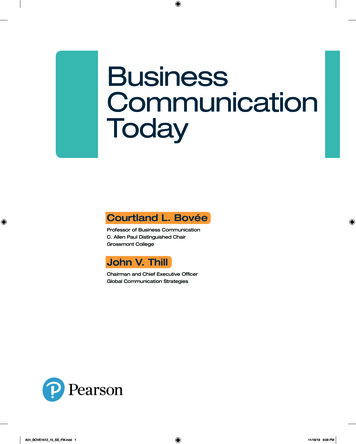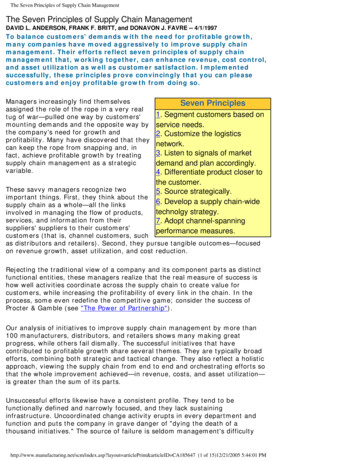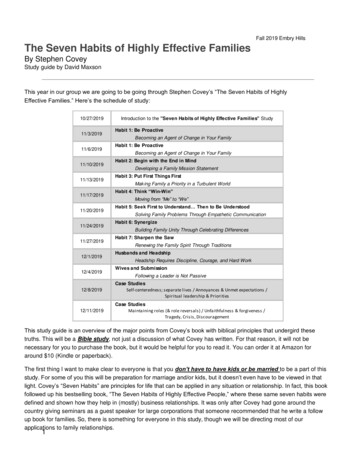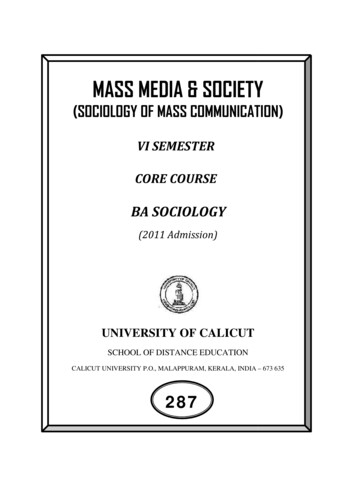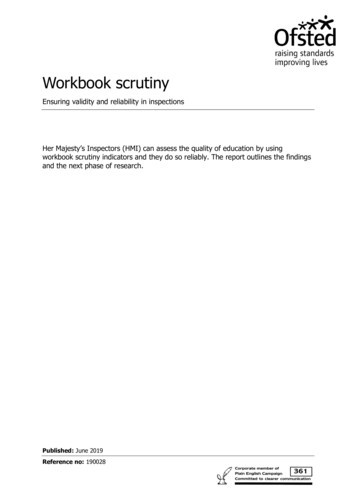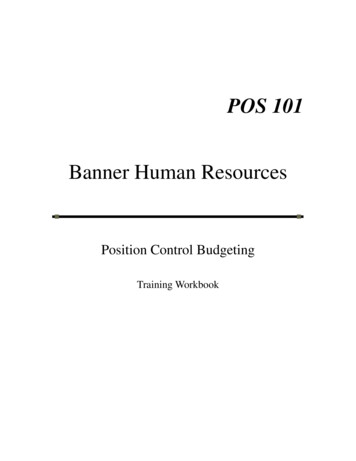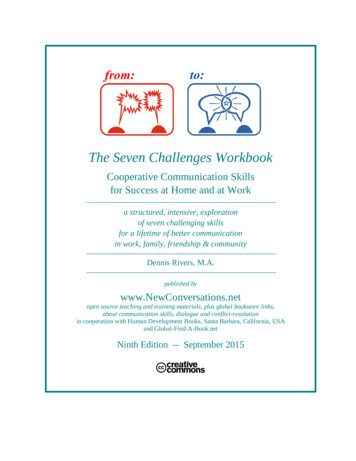
Transcription
from:to:The Seven Challenges WorkbookCooperative Communication Skillsfor Success at Home and at ��———————————————a structured, intensive, explorationof seven challenging skillsfor a lifetime of better communicationin work, family, friendship & ��Dennis Rivers, lished bywww.NewConversations.netopen source teaching and training materials, plus global bookstore links,about communication skills, dialogue and conflict-resolutionin cooperation with Human Development Books, Santa Barbara, California, USAand Global-Find-A-Book.netNinth Edition -- September 2015
Dedicated to the makers of peace in every faith.Where there is a clash of wills, may we bring a meeting of hearts.YOU CAN MAKE COPIES AND TRANSLATIONS OF THIS WORKBOOKFor non-profit distribution: You have permission to make an unlimited number of copies and/or translations of this entireworkbook (or parts thereof written by Dennis Rivers) for use in your family, school, college or university, business, publicagency, church, synagogue, mosque, temple, and/or community service organization, provided that such copies aredistributed to participants in your group at or below cost and include this permissions page (or in the case of sections orpages, include one of the short copyright notices described below).For general distribution (including course readers in colleges and universities): The pages and documents appearing in theSeven Challenges Workbook are copyright 1997 through 2015 by Dennis Rivers, except where otherwise noted or whereexcerpts from already copyrighted scholarly works have been cited in accordance the “Fair Use” doctrine of copyright law.The parts of this workbook written by Dennis Rivers may be copied, adapted, translated, distributed and/or sold in book orsheet format, under the terms of the "Creative Commons Attribution ShareAlike 2.5 License," which you can read athttp://creativecommons.org/licenses/by-sa/2.5/ This License provides that any such copies, editions, translations, and/oradaptations bear the license shown below, allowing others to reproduce and further develop the work adapted. The parts ofthis workbook written by authors other than Dennis Rivers retain their original copyright and cannot be sold to the generalpublic or incorporated into new works for sale without the permission of their respective authors.Please include the following notice at the end of any multiple-page copies of material written by Dennis Rivers:"Copyright 1997-2015 by Dennis Rivers. Reproduced with author's permission from the original atwww.NewConversations.net under the Creative Commons Attribution-ShareAlike 2.5 License,available at http://creativecommons.org/licenses/by-sa/2.5/, in all countries allowing Creative Commons licenses. In allother countries: Copyright 1997-2015 by Dennis Rivers. May be reproduced for educational and intra-organizational use."Please note individually reproduced pages written by Dennis Rivers as "Copyright 1997-2015 by Dennis Rivers.Reproduced with author's permission under Creative Commons license SA2.5."May all your efforts to create more cooperative families, workplaces and communities be blessed with success. (Thisworkbook is available as a series of free web pages and PDF files in English, Spanish and Portuguese atwww.NewConversations.net.)FREE DISTRIBUTION SUPPORTED BY BOOK LINKS AND YOUR BOOK PURCHASESThanks to your active participation, this Seven Challenges Workbook now has readers in 120 countries. You are invited tosupport the web-based, ongoing, global, free distribution of this workbook in PDF format, by downloading the PDF file andpassing it on to friends and colleagues. When reading from a PDF edition of this Workbook on an Internet-connectedcomputer, you can click on links in the footer of each page to order printed copies of the Workbook. You can also supportthe Workbook by purchasing communication-skills-related books from the wide selection at the New Conversations OnlineBookstore, ls-bookstore/ by clicking on live book links throughout thisdocument.Thank you helping to make this workbook a global resource for better interpersonal communication.Dennis Rivers -- www.NewConversations.net -- Human Development Books -- www.hudevbooks.com133 E. De la Guerra St. #423 -- Santa Barbara, CA 93101 -- USA
from:to:The Seven Challenges Workbook -- 2015 EditionCooperative Communication Skills for Success at Home and at WorkTABLE OF CONTENTSPageINTRODUCTIONANDOVERVIEWCHALLENGEONEHOW THIS WORKBOOK CAME TO BE, MY QUEST FORTHE SEVEN CHALLENGES, AND HOW WE BENEFITFROM A MORE COOPERATIVE STYLE OF LISTENINGAND TALKINGLISTENING MORE CAREFULLY AND RESPONSIVELYCHALLENGETHREECHALLENGEFOUR1-1Exercise 1-1: Active Listening.Exercise 1-2: Learning from the past with the tools of thepresent.CHALLENGETWOIntro-1EXPLAINING YOUR CONVERSATIONAL INTENTAND INVITING CONSENT1-71-82-1Exercise 2-1: Explaining the kind of conversation you want tohave.2-4Exercise 2-2: Exploring conversational intentions that createproblems.2-6EXPRESSING YOURSELF MORE CLEARLY ANDCOMPLETELY3-1Exercise: Exploring the Five Messages.3-4Reading 3-1: Saying What’s In Our Hearts3-8Reading 3-2: Peer Counseling With the Five Messages3-11TRANSLATING COMPLAINTS AND CRITICISMSINTO REQUESTS4-1Exercise 4-1: Working on your life situations.4-3Reading Exercise 4-2: Letting Go of Fearby David Richo, PhD4-4Reading Exercise 4-3: Trying Out The CooperativeCommunication Skills Emergency Kit4-11
PageCHALLENGEFIVECHALLENGESIXASKING QUESTIONS MORE “OPEN-ENDEDLY”AND MORE CREATIVELYPart 1: Asking questions more “open-endedly.”5-1Exercise 5-1: Using questions to reach out.5-2Exercise 5-2: Translating “yes-no” questions.5-3Part 2: Asking questions more creatively.5-4Exercise 5-3: Expanding your tool kit of creative questions.5-6Reading 5-1: Radical Questions for Critical Times, by SamKeen, PhD5-9EXPRESSING MORE APPRECIATIONResearch on the power of appreciation and gratefulness6-16-1Exploring the personal side of gratefulnessExercise 6-1: Events to be grateful forExploring Three-Part AppreciationsExercise 6-2: Expressing appreciation in three parts6-26-46-66-9CHALLENGESEVENADOPTING THE LIFE-AS-CONTINUOUS-LEARNINGAPPROACH: MAKE RESPONDING TO THE FIRST SIXCHALLENGES AN IMPORTANT PART OF YOUREVERYDAY LIVINGExercise: A homework assignment forthe rest of our lives.7-17-4Perspectives on the power of communication:Reading 7-1: A Summary of MINDSET: The NewPsychology of Success by Prof. Carol Dweck7-6Reading 7-2: Keep on Singing Michael7-8Reading 7-3: Guy Louis Gabaldon – a compassionate warriorsaves the lives of a thousand people7-9Reading 7-4: What Kind of Person am I Becoming? WhatKind of People are We Becoming Together? By DennisRivers7-11APPENDIXONESuggestions for further study: Great books on ns for starting a cooperative communication skills peersupport groupA2-1
Page Intro-1T h e Seven Ch al l en ges Com m uni ca t i on Skil l s Wor kbookwww. N e wC on ver sa t i on s. n etCommunication Skills Introduction and OverviewHOW T HIS WORKBO OK CAM E T O BE, MY Q UEST FOR T HE SEVEN CH ALLE NGES,AND HOW WE BENEF IT FROM A MORE COOPERAT I VEST YLE OF LIST ENING AN D T ALK INGSearching for what is most important. Thisworkbook proposes seven ways to guide yourconversations in directions that are moresatisfying for both you and your conversationpartners. I have selected these suggestions fromthe work of a wide range of communicationteachers, therapists and researchers in many fields.While these seven skills are not all a person needsto know about talking, listening and resolvingconflicts, I believe they are a large and worthwhilechunk of it, and a great place to begin.The interpersonal communication field suffersfrom a kind of “embarrassment of riches.” Thereis so much good advice out there that I doubt thanany one human being could ever follow it all. Tocite just one example of many, in the early 1990scommunication coach Kare Anderson wrote adelightful book1 about negotiation that includedone hundred specific ways to get more of whatyou want. The problem is that no one I know cancarry on a conversation and juggle one hundredpieces of advice in his or her mind at the sametime.So lurking behind all that good advice is theissue of priorities: What is most important tofocus on? What kinds of actions will have themost positive effects on people’s lives? Thisworkbook is my effort to answer those questions.My goal is to summarize what many agree are themost important principles of good interpersonalcommunication, and to describe these principles inways that make them easier to remember, easier toadopt and easier to weave together. Much of theinformation in this workbook has been known fordecades, but that does not mean that everyone hasbeen able to benefit from it. This workbook is mycontribution toward closing that gap.How we benefit from learning and using amore cooperative style. I have selected for thisworkbook the seven most powerful, rewardingand challenging steps I have discovered in myown struggle to connect with people and heal thedivisions in my family. None of this camenaturally to me, as I come from a family thatincludes people who did not talk to one anotherfor decades at a time. The effort is bringing mesome of each of the good results listed below (andI am still learning). These are the kinds ofbenefits that are waiting to be awakened by themagic wand of your study and practice.Get more done, have more fun, which couldalso be stated as better coordination of your lifeactivities with the life activities of the people whoare important to you. Living and working withothers are communication-intensive activities.The better we understand what other people arefeeling and wanting, and the more clearly othersunderstand our goals and feelings, the easier itwill be to make sure that everyone is pulling in thesame direction.More respect. Since there is a lot of mutualimitation in everyday communication (I raise myvoice, you raise your voice, etc.), when we adopt amore compassionate and respectful attitudetoward our conversation partners, we invite andinfluence them to do the same toward us.More influence.When we practice thecombination of responsible honesty andattentiveness recommended here, we are morelikely to engage other people and reachagreements that everyone can live with, we aremore likely to get what we want, and for reasonswe won’t regret later.2More comfortable with conflict. Because eachperson has different talents, there is much to be1Kare Anderson, Getting What You Want. NewYork: Dutton. 1993.2Thanks to communication skills teacherDr. Marshall Rosenberg for this pithy saying.Creative Commons: This page/workbook may be copied/reproduced. Free PDF e-book copies available at http://www.NewConversations.net/workbook/Order printed copies at http://www.NewConversations.net/orderbook/ More communication skills online resources: http://www.NewConversations.net
Page Intro-2 -- The Seven Challenges Workbook -- Introductiongained by people working together, andaccomplishing together what none could do alone.But because each person also has different needsand views, there will always be some conflict inliving and working with others. By understandingmore of what goes on in conversations, we canbecome better team problem solvers and conflictnavigators. Learning to listen to others moredeeply can increase our confidence that we will beable to engage in a dialogue of genuine give andtake, and be able to help generate problemsolutions that meet more of everyone’s needs.More peace of mind. Because every action wetake toward others reverberates for months (oryears) inside our own minds and bodies, adoptinga more peaceful and creative attitude in ourinteraction with others can be a significant way oflowering our own stress levels.Even inunpleasant situations, we can feel good about ourown skillful responses.More satisfying closeness with others.Learning to communicate better will get usinvolved with exploring two big questions:“What’s going on inside of me?” and “What’sgoing on inside of you?” Modern life is so full ofdistractions and entertainments that many peopledon’t know their own hearts very well, nor thehearts of others nearby. Exercises in listening canhelp us listen more carefully and reassure ourconversation partners that we really do understandwhat they are going through. Exercises in selfexpression can help us ask for what we want moreclearly and calmly.A healthier life. In his book, Love andSurvival,3 Dr. Dean Ornish cites study after studythat point to supportive relationships as a keyfactor in helping people survive life-threateningillnesses. To the degree that we use cooperativecommunication skills to both give and receivemore emotional support, we will greatly enhanceour chances of living longer and healthier lives.Respecting the mountain we are about toclimb together: why learning to talk and listenin new ways is challenging. I hope putting thesesuggestions into practice will surprise you withdelightful and heartfelt conversations you neverimagined were possible, just as I was surprised.And at the same time, I do not want to imply thatlearning new communication skills is easy.I wish the skills I describe in this workbookcould be presented as “Seven Easy Ways toCommunicate Better.”But in reality, therecommendations that survived my sifting andranking demand a lot of effort. Out of respect foryou, I feel the need to tell you that making big,positive changes in the way you communicatewith others will probably be one of the mostsatisfying and most difficult tasks you will evertake on, akin to climbing Mt. Everest. If I misledyou into assuming these changes were easy tomake, you would be vulnerable to becomingdiscouraged by the first steep slope. Fore-warnedof the amount of effort involved, you can plan forthe long climb. My deepest hope is that if youunderstand the following four reasons whylearning new communication skills is challenging,that under-standing will help you to be morepatient and more forgiving with yourself andothers.First of all, learning better communicationskills requires a lot of effort because cooperationbetween people is a much more complex andmentally demanding process than coercing,threatening or just grabbing what you want. Theneeds of two people (or many) are involved ratherthan just the needs of one. And thinking about thewants of two people (and how those wants might3Dean Ornish, MD, Love and Survival. New York:HarperCollins. 1998. Chap. 2.Creative Commons: This page/workbook may be copied/reproduced. Free PDF e-book copies available at http://www.NewConversations.net/workbook/Order printed copies at http://www.NewConversations.net/orderbook/ More communication skills online resources: http://www.NewConversations.net
The Seven Challenges Workbook -- Introduction -- Page Intro-3overlap) is a giant step beyond simply feelingone’s own wants.4The journey from fighting over the rubberducky to learning how to share it is the longestjourney a child will ever make, a journey thatleads far beyond childhood. Reaching this higherlevel of skill and fulfillment in living and workingwith others requires effort, conscious attention,and practice with other people.A second reason that learning more effectiveand satisfying communication skills does nothappen automatically is that our way ofcommunicating with others is deeply woven intoour personalities, into the history of our hearts.For example, if, when I was little, someoneslapped me across the face or yelled at me everytime I spoke up and expressed a want or opinion,then I probably would have developed a verysensible aversion to talking about what I wasthinking or feeling. It may be true that no one isgoing to hit me now, but a lot of my brain cellsmay not know that yet. So learning new ways ofcommunicating gets us involved in learning newways of feeling in and feeling about all ourrelationships with people. We can become moreconfident and less fearful, more skillful and lessclumsy, more understanding of others and lessthreatened by them. Changes as significant asthese happen over months and years rather than ina single weekend.A third side of the communications mountainconcerns self-observation. In the course of livingour attention is generally pointed out toward otherpeople and the world around us. As we talk andjoke, comfort others and negotiate with them, weare often lost in the flow of interaction.Communicating more cooperatively involvesexerting a gentle influence to guide conversationstoward happier endings for all the participants.But in order to guide or steer an unfoldingprocess, a person needs to be able to observe that4I am grateful to the books of developmentalpsychologist Robert Kegan, The Evolving Self and InOver Our Heads: The Mental Demands of Modern Life,(both Harvard Univ. Press) for introducing me to the ideathat cooperation is more mentally demanding thancoercion. After that idea, nothing in human communication looked the same.process. So communicating more cooperativelyand more satisfyingly requires that we learn howto participate in our conversations and observethem at the very same time! It takes a while togrow into this participating and observing at thesame time. At first we look back on conversationsthat we have had and try to understand what wentwell and what went badly. Gradually we can learnto bring that observing awareness into ourconversations.A final reason (four is surely enough) thatlearning new communication skills takes effort isthat we are surrounded by a flood of badexamples. Every day movies and TV offer us acontinuing stream of vivid images of sarcasm,fighting, cruelty, fear and mayhem. And as beerand cigarette advertisers have proven beyond ashadow of a doubt, you can get millions of peopleto do something if you just show enough vividpictures of folks already doing it. So at some verydeep level we are being educated by the massmedia to fail in our relationships.5 For everymovie about people making peace with oneanother, there seem to be a hundred movies aboutpeople hacking each other to death with chainsawsor literally kicking one another in the face, whichare not actions that will help you or me solveproblems at home or at the office. Learning torelate to others generally involves followingexamples, but our examples of interpersonal skilland compassion are few and far between.These are the reasons that have led me to seelearning new communication skills as ademanding endeavor. My hope is that you willlook at improving your communication skills as along journey, like crossing a mountain range, sothat you will feel more like putting effort andattention into the process, and thus will get moreout of it. Living a fully human life is surprisinglysimilar to playing baseball or playing the violin.Getting better at each requires continual practice.You probably already accept this principle inrelation to many human activities. I hope thisworkbook will encourage and support you in5For an extended examination of this issue, seeSissela Bok, Mayhem: Violence as Public Entertainment.Reading, MA: Addison-Wesley. 1998.Creative Commons: This page/workbook may be copied/reproduced. Free PDF e-book copies available at http://www.NewConversations.net/workbook/Order printed copies at http://www.NewConversations.net/orderbook/ More communication skills online resources: http://www.NewConversations.net
Page Intro-4 -- The Seven Challenges Workbook -- Introductionapplying it to your own talking, listening andasking questions.Seven ways of being the change you want tosee.Because conversations are a bringingtogether of both persons’ contributions, when youinitiate a positive change in your way of talkingand listening, you can single-handedly begin tochange the quality of all your conversations. Theactions described in this work-book are sevenexamples of “being the change you want to see” (asaying I recently saw attributed to MahatmaGandhi, the great teacher of nonviolence).While this may sound very idealistic and selfsacrificing, you can also understand it as apractical principle: model the behavior you wantto evoke from other people.The SevenChallenges are also examples of another saying ofGandhi’s: “the means are the ends.”Communicatingmoreawarelyandcompassionately can be satisfying ends inthemselves, both emotionally and spiritually.They also build happier families and moresuccessful businesses.order to get more of your conversation partner’sattention in tense situations, pay attention first:listen and give a brief restatement of what youhave heard (especially feelings) before youexpress your own needs or position. The kind oflisteningrecommendedhereseparatesacknowledging from approving or agreeing.Acknowledging another person’s thoughts andfeelings does not have to mean that you approveof or agree with that person’s actions or way ofexperiencing, or that you will do whateversomeone asks. Some of the deeper levels of this first stepinclude learning to listen to your own heart, andlearning to encounter identities and integritiesquite different from your own, while stillremaining centered in your own sense of self.Challenge 2. Explain your conversationalintent and invite consent. In order to help yourconversation partner cooperate with you and toreduce possible misunderstandings, start importantconversations by inviting your conversationpartner to join you in the specific kind ofconversation you want to have. The more theconversation is going to mean to you, the moreimportant it is for your conversation partner tounderstand the big picture. Many successfulcommunicators begin special conversations with apreface that goes something like: “I would like totalk with you for a few minutes about [subjectmatter]. When would be a good time?” Theexercise for this step will encourage you to expandyour list of possible conversations and to practicestarting a wide variety of them.A brief summary of each challenge is givenin the paragraphs that follow, along with someof the lifelong issues of personal development thatare woven through each one. In Chapters Onethrough Seven you will find expandeddescriptions of each one, with discussions,examples, exercises and readings to help youexplore each suggestion in action. Some deeper levels of this second step includelearning to be more aware of and honest aboutyour intentions, gradually giving up intentions toinjure, demean or punish, and learning to treatother people as consenting equals whoseparticipation in conversation with us is a gift andnot an obligationChallenge 1.Listen more carefully andresponsively. Listen first and acknowledge whatyou hear, even if you don’t agree with it, beforeexpressing your experience or point of view. InChallenge 3. Express yourself more clearlyand completely. Slow down and give yourlisteners more information about what you areexperiencing by using a wide range of “I-Creative Commons: This page/workbook may be copied/reproduced. Free PDF e-book copies available at http://www.NewConversations.net/workbook/Order printed copies at http://www.NewConversations.net/orderbook/ More communication skills online resources: http://www.NewConversations.net
The Seven Challenges Workbook -- Introduction -- Page Intro-5statements.” One way to help get more of yourlistener’s empathy is to express more of the fivebasic dimensions of your experience: Here is anexample using the five main “I-messages”identified by various researchers over the past halfcentury: (Please read down the columns.)The Five I-Messages Example of aFive dimensions"Five I-Message"of experiencecommunicationExpressing yourself this carefully might appear totake longer than your usual quick style ofcommunication. But if you include all the time ittakes to unscramble everyday misunderstandings,and to work through the feelings that usuallyaccompany not being understood, expressingyourself more completely can actually take a lotless time. Some deeper levels of this third step includedeveloping the courage to tell the truth, growingbeyond blame in under-standing painfulexperiences, and learning to make friends withfeelings, your own and other people’s, too.1. What are youseeing, hearing orotherwise sensing?."When I saw thedishes in the sink.2. What emotions areyou feeling?.I felt irritatedand impatient.3. What interpretations or wants ofyours that supportthose feelings?.because I want tostart cookingdinner rightaway.4. What action,information orcommitment youwant to requestnow?.and I want to askyou to help me dothe dishes rightnow.Challenge 4.Translate your (and otherpeople’s) complaints and criticisms into specificrequests, and explain your requests. In order toget more cooperation from others, wheneverpossible ask for what you want by using specific,action-oriented, positive language rather than byusing generalizations, “why’s,” “don’ts” or“somebody should’s.” Help your listeners complyby explaining your requests with a “so that.”, “itwould help me to. if you would.” or “in orderto. .” Also, when you are receiving criticismand complaints from others, translate and restatethe complaints as action requests. .”).5. What positiveresults willreceiving thataction, informationor commitment leadto in the future?.so that dinnerwill be ready by thetime Mike and Joeget here." Some of the deeper levels of this fourth stepinclude developing a strong enough sense of selfesteem that you can accept being turned down,and learning how to imagine creative solutions toproblems, solutions in which everyone gets atleast some of their needs met.Anytime one person sincerely listens toanother, a very creative process is going on inwhich the listener mentally reconstructs thespeaker’s experience.The more facets ordimensions of your experience you share witheasy-to-grasp “I statements,” the easier it will befor your conversation partner to reconstruct yourexperience accurately and understand what youare feeling. This is equally worthwhile whetheryou are trying to solve a problem with someone ortrying to express appreciation for them.Challenge 5. Ask questions more “openendedly” and more creatively.“Openendedly.”: In order to coordinate our life andwork with the lives and work of other people, weall need to know more of what other people arefeeling and thinking, wanting and planning. Butour usual “yes/no” questions actually tend to shutpeople up rather than opening them up. In orderto encourage your conversation partners to sharemore of their thoughts and feelings, ask “openended” rather than “yes/no” questions. Openended questions allow for a wide range ofresponses. For example, asking “How did youlike that food/movie /speech/doctor/etc.?” willevoke a more detailed response than “Did you likeCreative Commons: This page/workbook may be copied/reproduced. Free PDF e-book copies available at http://www.NewConversations.net/workbook/Order printed copies at http://www.NewConversations.net/orderbook/ More communication skills online resources: http://www.NewConversations.net
Page Intro-6 -- The Seven Challenges Workbook -- Introductionit?” (which could be answered with a simple “yes”or “no”). In the first part of Challenge Five weexplore asking a wide range of open-endedquestions.“and more creatively.”When we askquestions we are using a powerful language tool tofocus conversational attention and guide ourinteraction with others.But many of thequestions we have learned to ask are totallyfruitless and self-defeating (such as, parents to apregnant teen, “Why?!!! Why have you donethis to us?!!!”). In general it will be morefruitful to ask “how” questions about the futurerather than “why” questions about the past, butthere are many more creative possibilities as well.Of the billions of questions we might ask, not allare equally fruitful or illuminating; not all areequally helpful in solving problems together. Inthe second part of Challenge Five we exploreasking powerfully creative questions from manyareas of life. Deeper levels of this fifth step includedeveloping the courage to hear the answers to ourquestions, to face the truth of what other peopleare feeling. Also, learning to be comfortablewith the process of looking at a situation fromdifferent perspectives, and learning to accept thatpeople often have needs, views and tastesdifferent from your own (I am not a bad person ifyou love eggplant and I can’t stand it).Challenge 6. Express more appreciation. Tobuild more satisfying relationships with the peoplearound you, express more appreciation, delight,affirmation, encouragement and gratitude.Because life continually requires us to attend toproblems and breakdowns, it gets very easy to seein life only what is broken and needs fixing. Butsatisfying relationships (and a happy life) requireus to notice and respond to what is delightful,excellent, enjoyable, to work well done, to foodwell cooked, etc. It is appreciation that makes arelationship strong enough to accommodatedifferences and disagreements. Thinkers andresearchers in several different fields have reachedsimilar conclusions about this:healthyrelationships need a core of mutual appreciation. One deeper level of this sixth step is in howyou might shift your overall level of appreciationand gratitude, toward other people, toward nature,and toward life and/or a “Higher Power.”Challenge 7. Adopt the “continuous learning”approach to living, making better communicationan important part of your everyday life. In orderto have your new communication skills availablein a wide variety of situations, you will need topractice them in as wide a variety of situations aspossible, until, like driving or bicycling, theybecome “second nature.” The Seventh Challengeis to practice your evolving communication skillsin everyday life, s
workbook is available as a series of free web pages and PDF files in English, Spanish and Portuguese at www.NewConversations.net.) FREE DISTRIBUTION SUPPORTED BY BOOK LINKS AND YOUR BOOK PURCHASES Thanks to your active participation, this Seven Challenges Work


